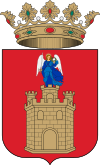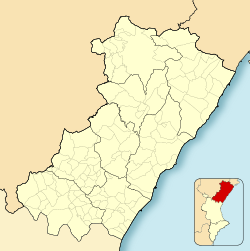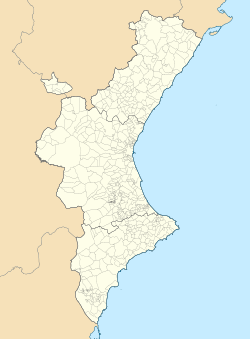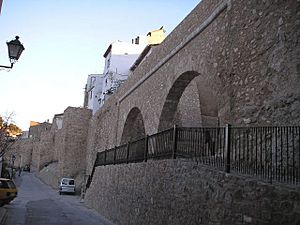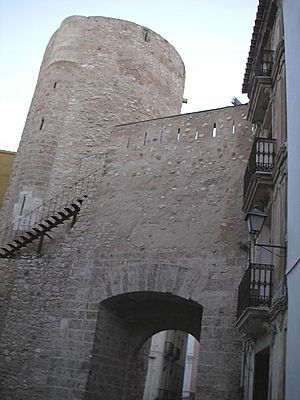Segorbe facts for kids
Quick facts for kids
Segorbe
|
|||
|---|---|---|---|
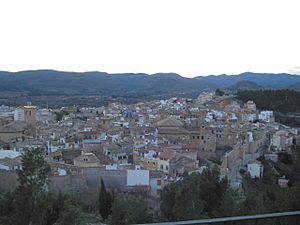
General view of Segorbe from its castle.
|
|||
|
|||
| Country | |||
| Autonomous community | |||
| Province | Castellón | ||
| Comarca | Alto Palancia | ||
| Judicial district | Segorbe | ||
| Area | |||
| • Total | 107.52 km2 (41.51 sq mi) | ||
| Elevation | 358 m (1,175 ft) | ||
| Population
(2018)
|
|||
| • Total | 8,878 | ||
| • Density | 82.571/km2 (213.857/sq mi) | ||
| Demonym(s) | Segorbinos | ||
| Time zone | UTC+1 (CET) | ||
| • Summer (DST) | UTC+2 (CEST) | ||
| Postal code |
12400
|
||
| Official language(s) | Spanish | ||
Segorbe is a cool town in the mountains of Spain. It's located in the province of Castellón, which is part of the Valencian Community. The old palace where the Dukes of Medinaceli used to live is now the home of the city's mayor! Every September, Segorbe has a famous bull-running event called semana de Toros. It's super popular and brings in about 200,000 visitors!
Contents
Segorbe's Location and Landscape
Segorbe is a town with a beautiful natural setting. The Palancia River flows right through the area. It runs from the northwest to the southeast. This town is on a natural path between Aragón and the Valencian Community. It sits between two mountain ranges. To the north is the Serra d'Espadà. To the south is the Serra Calderona. The main part of the town is about 358 meters (1,175 feet) high. It is built on two hills that rise from the riverbank.
A Look Back at Segorbe's History
People have lived in the Segorbe area for a very long time. Archaeologists have found items from the middle Palaeolithic Age. This shows that humans were here thousands of years ago. Some people once thought Segorbe was the ancient city of Segobriga. Pliny the Elder, a Roman writer, described Segobriga as the capital of Celtiberia. However, new digs have found a large Roman city in La Mancha. This new site is now believed to be the real Segobriga. During the time of the Visigoths in Spain, Segorbe became a church center.
In the 700s, Moors from North Africa took over Segorbe. The town's main church became a mosque. Segorbe was where Zayd Abu Zayd lived. He was the last Almohad governor of Valencia. After he became a Christian, Segorbe helped in the conquest of Valencia. This happened in 1238. In 1435, Segorbe became part of the royal lands of the Kingdom of Aragon.
Exploring Segorbe's Main Sights
Segorbe has many interesting places to visit. The Segorbe Cathedral was finished in 1534. It was made bigger in 1795. A bridge connects the cathedral to the old bishop's palace. Its tower and cloister (a covered walkway) have a unique shape.
The old castle of Segorbe might have been built on an ancient Iberian fort. It started as a Moorish fortress. It was most grand in the late 1400s. Martin of Aragon, a king, even held his court here. Later, the town's main offices moved to a new palace. The castle then fell into disrepair. From the mid-1700s, its stones were used to build other buildings. These included a hospital and a charity house.
Other cool places to see include:
- The Church of St. Martin, built in the fancy Baroque style in 1612.
- The Baroque church of San Joaquín y Santa Ana, built in 1695.
- The old medieval walls, which are from before the 1200s.
- Part of the wall includes a 14th-century aqueduct.
- You can see the Arch of Veronica, the Botxi Tower (17.30 meters tall!), and the Cárcel Tower (from the 1300s).
- The Town Hall, which started being built in the 1500s.
- The Cathedral Museum, full of art and history.
- The Archaeology and Ethnology Museum, showing ancient finds and local culture.
The Dukes of Segorbe
The title of Duke of Segorbe was created in the Kingdom of Valencia. King Ferdinand I of Aragon started this noble line. He made his oldest son, Enric I, the first lord of Segorbe. Later, Enric II became the first Duke of Segorbe. The title then passed down through his family. Eventually, the dukedom passed to the Medinaceli family in 1690. Today, the current Duke of Segorbe is don Ignacio de Medina y Fernández de Córdoba. He is married to Princess Maria da Gloria of Orléans-Braganza.
See also
 In Spanish: Segorbe para niños
In Spanish: Segorbe para niños
 | Precious Adams |
 | Lauren Anderson |
 | Janet Collins |



